Case management: ActivityInfo as a protection information management system
ActivityInfo is an information management platform which can be used in a variety of settings ranging from monitoring and evaluation to case management thanks to its powerful Database builder and Form designer as well as other features which help simplify the process of information management and data collection. Whether you are working with development programmes or an emergency response we have developed Database templates, user Roles, permissions and Form fields to cover your needs.
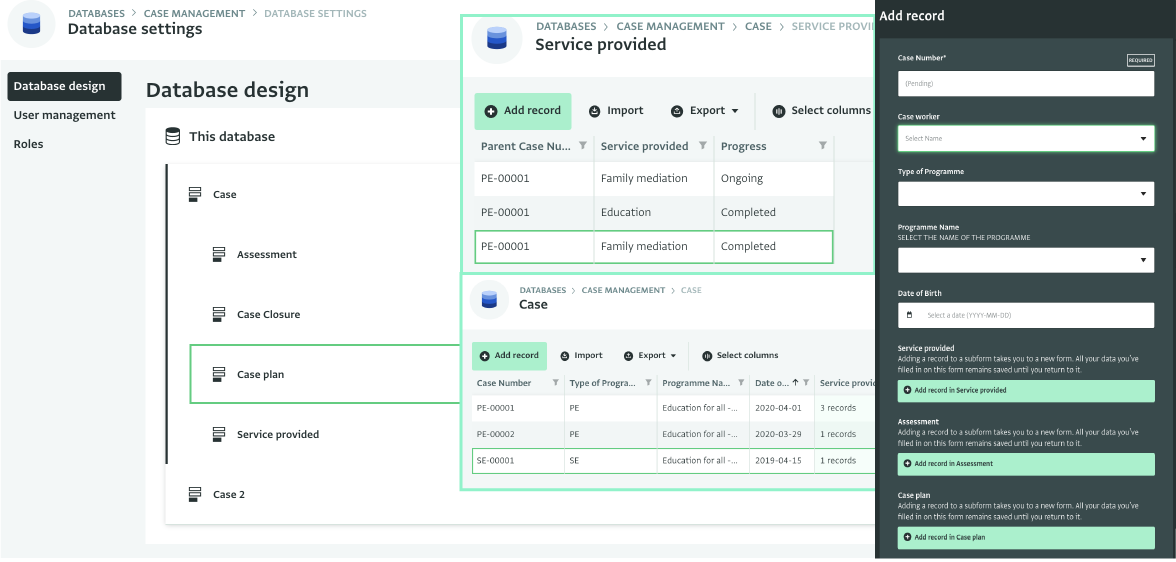
In our previous blog posts and Case Studies we have explored how Databases can be designed for the monitoring and evaluation of development programmes, for information management in regional responses, for rapid-response mechanisms and many more. In this blog post, we will explore the use of ActivityInfo as an information management system for case management and referral.
You can always test the platform and all its features to see if is meets your needs with a Free Trial.
Templates to get started with case management
We offer many database templates to help you get started with your work. You can select a template and add it to your account so as to make any changes you want in the database, forms, roles and records in it. Here is our selection of templates for Case management:
The model for intensive and multi-team Case management
This model can be used to work with wraparound case management that includes multiple teams working with the same group of clients. Start working with this database template. You can also watch [our latest webinar recording on using ActivityInfo for case management to learn more.
The Case mnagement database template for Protection, Child Protection and GBV Cases
This template can be used to work with case management for protection, child protection and gender-based violence cases. Start working with this database template.
The built-in Case management database template
When you add a new Database in ActivityInfo you can select from a list of templates to get started quickly with some predefined user Roles. We designed a Case management Database template which comes with three ready-to-use Roles; Administrator, Supervisor and Case worker. By using this Database template you can create teams of Case workers under individual Supervisors. View the full tutorial on setting up a Database for case management in our User Manual.
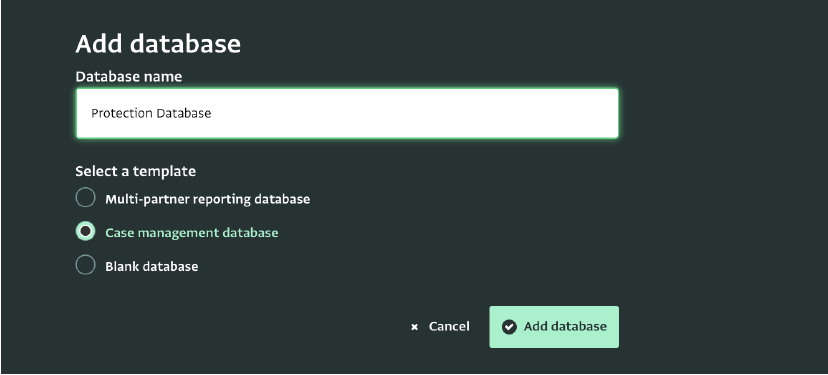
Data security
With regards to data security, in the SaaS version of ActivityInfo data is securely stored in servers in multiple locations across Europe, using infrastructure provided by the Google Cloud Platform (GCP). By keeping multiple copies of the data in multiple locations we make sure we have enough backups in case of a natural disaster or failure of one region's server. This means that you don’t need to keep backups of data and worry about issues such as the Recovery Point Objective (RPO) (i.e. the maximum acceptable amount of time during which the data might be lost) and how quickly your system can recover. Thus, if you are looking for a solution that will handle such issues for you, ActivityInfo can cover you.
In addition, ActivityInfo offers a self-managed server which can be managed by your team, runs on a physical computer on premise or on a cloud account you manage. Can run on internal networks, including air-gapped networks. Learn more about the Self-managed server.
Features that facilitate Case management
Roles and permissions
The Roles and permissions of this Database template have been designed so that you can quickly assign specific permissions to the users you invite only for the cases you select. You can select from the Roles of Administrator, Case worker and Supervisor or you can create your own Roles. By assigning Roles to the users you invite to your case management Database you fully control what resources they can access and in what way.
Read more about the available Roles in case management Database template in our User Manual.
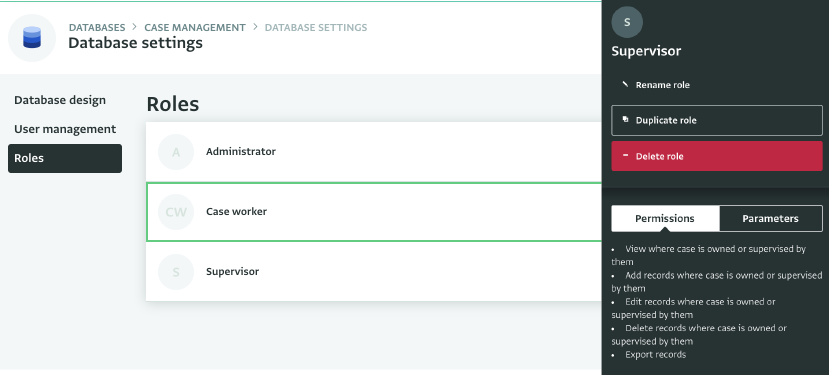
Anonymize data, link Forms, assign cases
Among the variety of fields you can use in the Forms you design, the Serial Number and the Reference field are two of the most important. A Serial Number allows you to anonymize the data collected as it automatically generates a code for each case. Then, a Reference field in a new Form allows you to link to the case using just the Serial Number. By adding a prefix to the Serial Number you can customize it based on specific information that the case worker provides for the case and thus make the case easier to track without revealing any other information about the case or the individual that the case is related to. Read more about Serial Numbers in our User Manual.
Also, with the User field you can assign a specific case to a specific case worker or supervisor that has been added to the Database and can access the Form.
Work offline on desktop or a mobile device
Finally, when case workers work in the field, offline data collection can be done using a mobile device. Just create some empty cases beforehand to make sure that Serial Numbers will be assigned properly by the system before going offline.
When using the ActivityInfo mobile app you reduce error possibilities that can be a result of moving data across systems thanks to two-way synchronization. . Unlike other standalone mobile data collection tools that require additional data systems to import collected data, in ActivityInfo, data is added to your databases and is ready for analysis the moment it's collected. You can always review data in real-time in the field or in the office and reach insights within minutes –all in one comprehensive system.
Examples from the field
Several organizations such as UNRWA, UNFPA and the Danish Refugee Council in Bangladesh have used ActivityInfo as an information management system for case management.
For the past five years ActivityInfo has been used by UNRWA as a protection information management system for case management and referral of protection cases. In our 2017 User Conference in Geneva, Sasha Abdi from UNRWA presented the Protection Database that was developed at that time by the organization and explained how the platform was used as well as why it was selected among other options. View the video with the presentation.
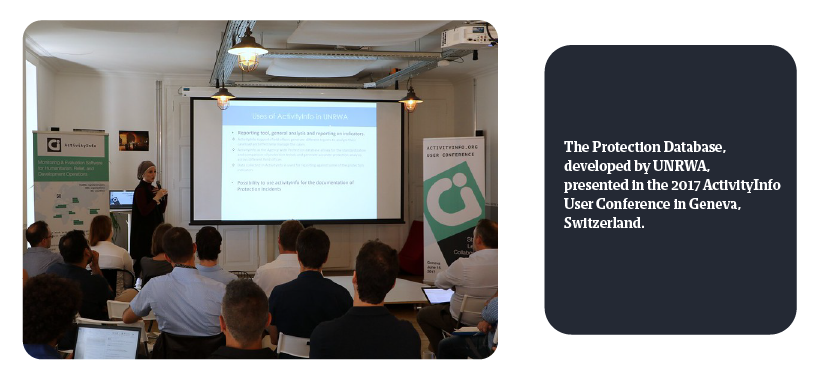
The Danish Refugee Council in Bangladesh is a more recent example of an organization which adopted ActivityInfo for case management when they decided to digitize their paper-based case management system. The country office was considering the advantages and disadvantages of building their own in-house system or using other open source platforms, and decided to use ActivityInfo for their case management activities because there was an urgent need to put a system in place, quickly and easily. When designing the Database, the Information Management Manager of the team created separate Folders for each Form in order to be able to control the level of access the case workers will have to each individual type of Form. Also, they created different teams in order to manage the permissions of each case worker at an individual and at a group level. Read the whole story of how the Danish Refugee Council in Bangladesh decided to use ActivityInfo as their case management platform in our latest Case Study.
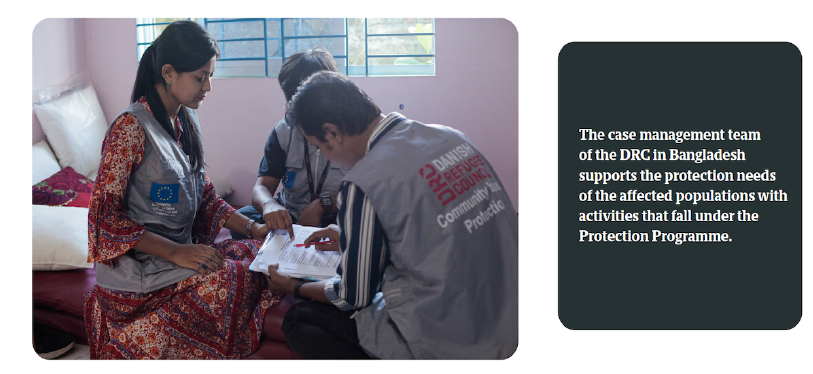
ActivityInfo versus open-source, on premise or internal case management systems
If you are considering adopting an information management system for case management, there are several types of options available. We summarized the contexts in which ActivityInfo can be a more effective solution.
ActivityInfo is offered as a Software as a Service (SaaS) and is web-based but it also offers the possiblity to use the Self-managed Server so as to run ActivityInfo on a network not accessible via the public internet, including air-gapped networks.
Immediacy of use
You can immediately start use ActivityInfo's functions, while the deployment of custom software or open-source tools takes more time. This agile approach allows you to accelerate the process and the free trial allows your staff to get acquainted with the platform and to make sure the features fit their needs. Also testing and debugging are not required from tyour side as our team takes care of everything related to the development of the platform.
Lifetime cost of the platform
There are lower upfront costs in relation to custom development because you can use ActivityInfo with a monthly or annual subscription rather than investing in building software from scratch. Also the long-term ownership costs may well be lower than for custom development and if there is high dependency between budget and donor funding, an off-the-shelf solution might be the best option.
Regarding the deployment cost, while in many cases this might include the salaries of several IT consultants or could take plenty of time, with the SaaS version of ActivityInfo there is none, as you can create an account, log in and be ready to go. Moreover, the cost of maintaining software, applying security patches or configuring software to include workflows and processes that go beyond the basics often includes plenty of direct and indirect costs (e.g. IT salaries ranging from €50,000 to €150,000 per year depending on location, hosting, SSL certificates, etc.)
Documentation and further support
On the ActivityInfo website you can find a large database of supporting documentation to help navigate its available features. As we have been developing the platform for more than 10 years we have a deep understandng of users' requirements and frequently encountered problems. As a result with offer a greater wealth of support materials, such as user guides, help center articles, webinars, and FAQs, for you to rely on. At the same time, the cloud-version comes with a Service Level Agreement and an experienced support team. This means you can get direct access to the developers of the software to get help when you need it.
As the ActivityInfo team is responsible for the software, the releases and all the updates, you don’t need to spend resources such as time and funds on finding the right technical team to build, document and maintain your solution. You don’t have to worry about finding a technical team who understands your data collection needs and the way your programme works as we have cooperated for years with people working in the field making sure we develop a solution that responds to what they need.
Some other points to consider
Something else to consider in relation to custom development is the risk of failure or budget overrun. The Standish Group has reported that 31% of software development projects will be canceled before they're completed, and 53% of projects will run over budget by nearly twice as much (189%) as originally budgeted.
Finally, ActivityInfo has been designed speifically for humanitarian operations so in contrast to highly-customizable Customer Relationship Management (CRM) systems like Salesforce or Microsoft Dynamics, it has been built from the ground up for organizations working in challenging environments and features essential functionality like offline availability and a seamlessly integrated mobile data collection app that CRMs built for sales teams naturally lack.
All in all, ActivityInfo has been designed with a focus on making information management easier and accessble to all humanitarians. You can always test the platform and all its features to see if is meets your needs with a Free Trial or contact us to arrange a demo tailored to your organization's needs